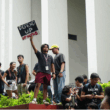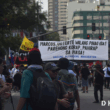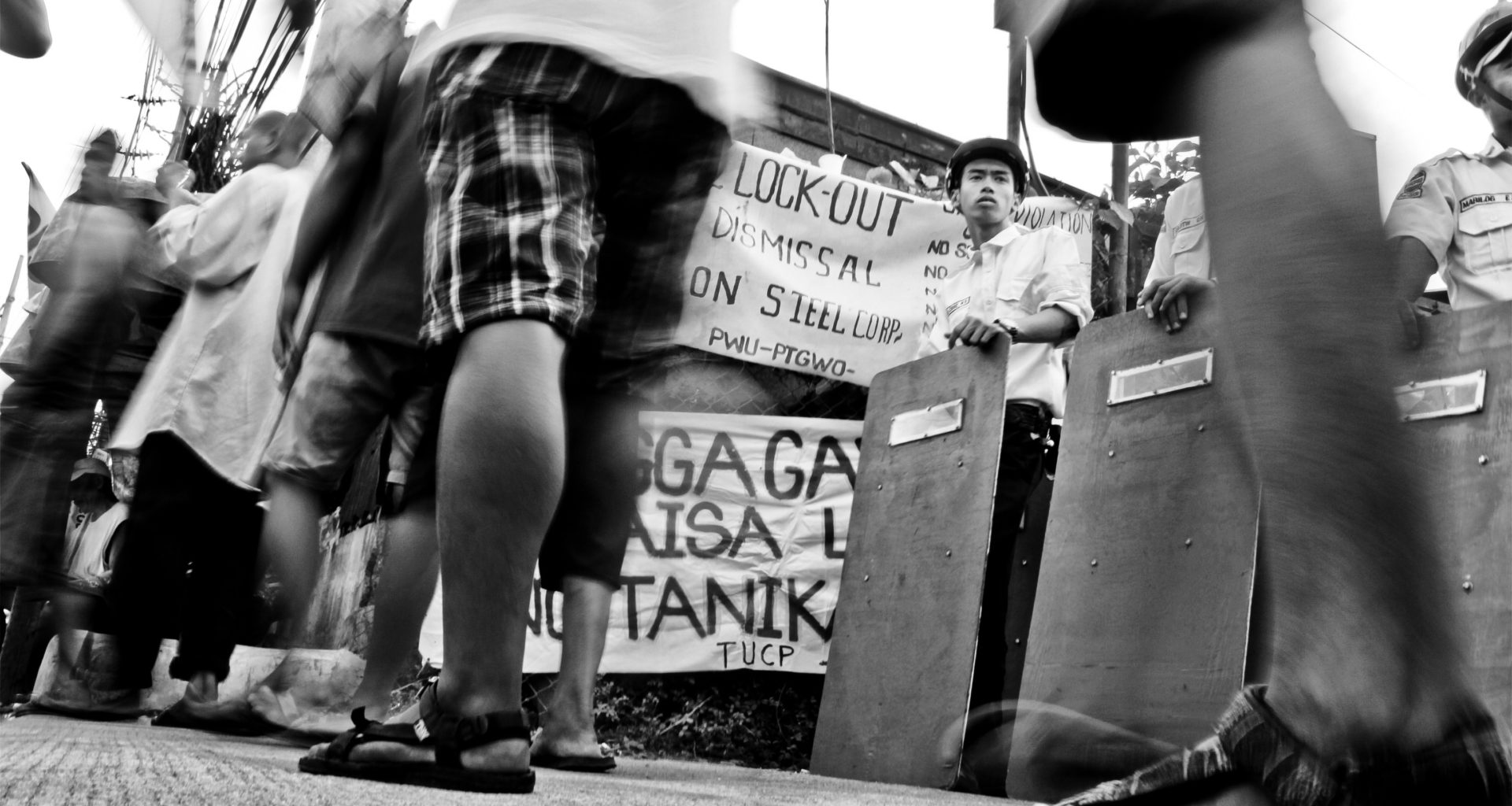As President Noynoy Aquino delivered his fourth State of the Nation Address yesterday at the Batasan Complex, the workers of Pentagon Steel were not too far away while at the People’s SONA held along Commonwealth Avenue. However, this is a distance never bridged – not by three months of picketing, not by the loss of lives and homes, not by the chants of a hundred workers and sympathizing sectors. Yesterday, the President still spared neither word nor second for the workers lost in the “tuwid na daan”.
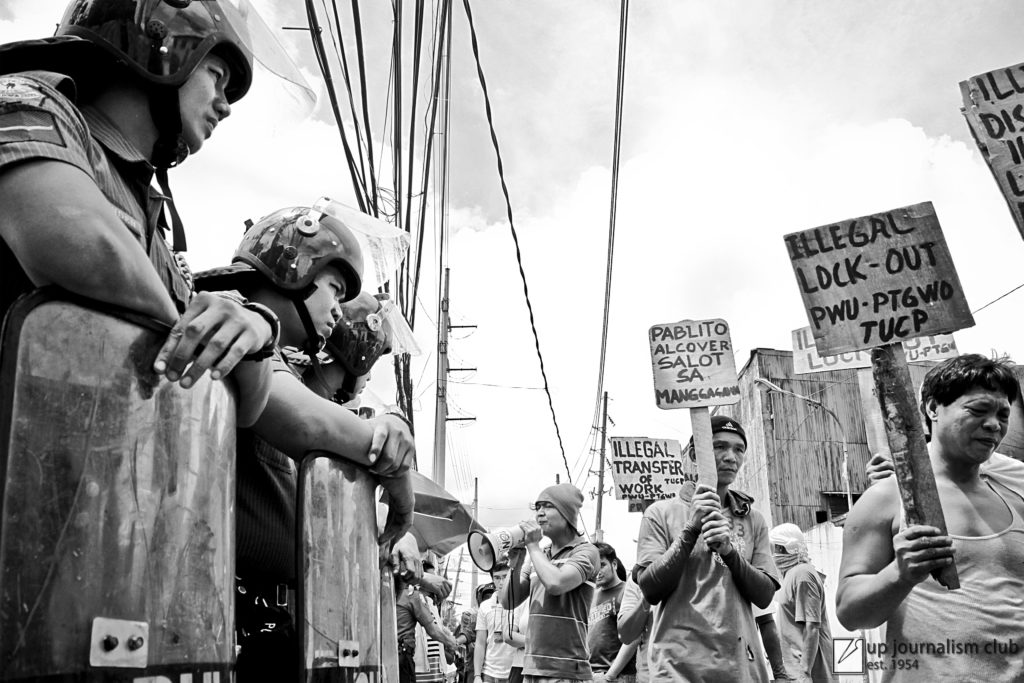
QUEZON CITY – July 13 marked the third month since the workers of Pentagon Steel Corporation first began their picket protest along Kaingin Road in Barangay Apolonio Samson.
This day, however, was marred with violence as a factory security guard died and others were injured in a violent clash that occurred at the picket line Saturday afternoon, according to reports.
The lockout and eventual dismissal of 134 factory workers last April sparked the workers’ picket protest – an ongoing labor dispute with the Pentagon Steel management.
Through the Pentagon Workers’ Union (PWU), the dismissed workers asserted their labor rights and demanded their reinstatement without retaliation.
Aside from the illegal lockout and dismissal of workers, the Pentagon management allegedly committed a number of Labor Code violations, according to Jerico Canciller, a Pentagon union leader and a machine operator for 13 years.
Canciller said that the safety of workers was not ensured within the factory, as there is no proper ventilation despite the old, steaming machines. Nor are they given any protective gear or insurance for work-related injuries, he added.
According to Canciller, majority of the dismissed workers had been with the factory for at least 20 years; however, these decades of labor were met only by the minimum wage set by the Department of Labor and Employment (DOLE).
Workers receive no seniority or retirement benefits, no overtime and holiday pays – not even security of tenure, said Canciller.
“Ang tawag nga nila (Management) sa amin ay mga regular na contractual,” Canciller recalled.
(The Management calls us regular contractual workers.)
Locked out of Steel
Pentagon Steel Corporation began operations in 1975, founded and administered by tycoon Mariano Chan. The factory is one of the largest suppliers of steel products in the country.
In 2012, workers Danilo Amores and Joey Dubluis, who were deemed labor rights activists, were dismissed, allegedly under the orders of Human Resources Manager Pablito Alcover, said Canciller. Amores was dismissed on May 13, while Dubluis experienced the same fate barely two months later.
A day after Dubluis’ arrest, 54 workers gathered in front of the management office during their lunch break but were locked out of the factory until the end of their shift. Alcover later issued one-month preventive suspension orders for the 54 men.
By the time the suspension lapsed, the workers were made to sign blank waivers forbidding them from holding protests inside the factory, but they refused to sign the document. According to Dubluis, the workers were told by management, “Kung di kayo pipirma, lumabas ulit kayo.”
Several months after the suspension, workers were transferred across departments – some forced to do manual labor, and time and time again, were presented blank waivers.
On the morning of April 13, 2013, the management wholly refused the entry of 134 workers who were members of the union. They were laid off. By noon, they began picketing in front of the company’s gates.
According to Canciller, their union is not necessarily on strike but is on a picket protest. Because they were illegally locked out, they immediately began picketing and did not need to file a Notice of Strike (NOS), which normally takes 15 days or more before taking into effect.
The workers filed a case of illegal dismissal and lockout against Pentagon Steel to the DOLE National Labor Relations Commission (NLRC) on April 15, under the instruction of their lawyer Atty. Remigio Saladero Jr. In turn, Pentagon Steel filed a case of illegal strike and direct assault against PWU, said Canciller.
“Advice sa amin ng abogado namin na mauna kami dapat, kasi sa karanasan niya, kung nauuna ang management, natatalo ang manggagawa sa ganitong issue,” Canciller said.
(Our lawyer advised us to file the case first, because from his experience, if the management gets to file first, the workers usually lose in these kinds of issues.)
JC Reports tried to reach the management of Pentagon Steel Corporation, but they refused to comment on the issue.
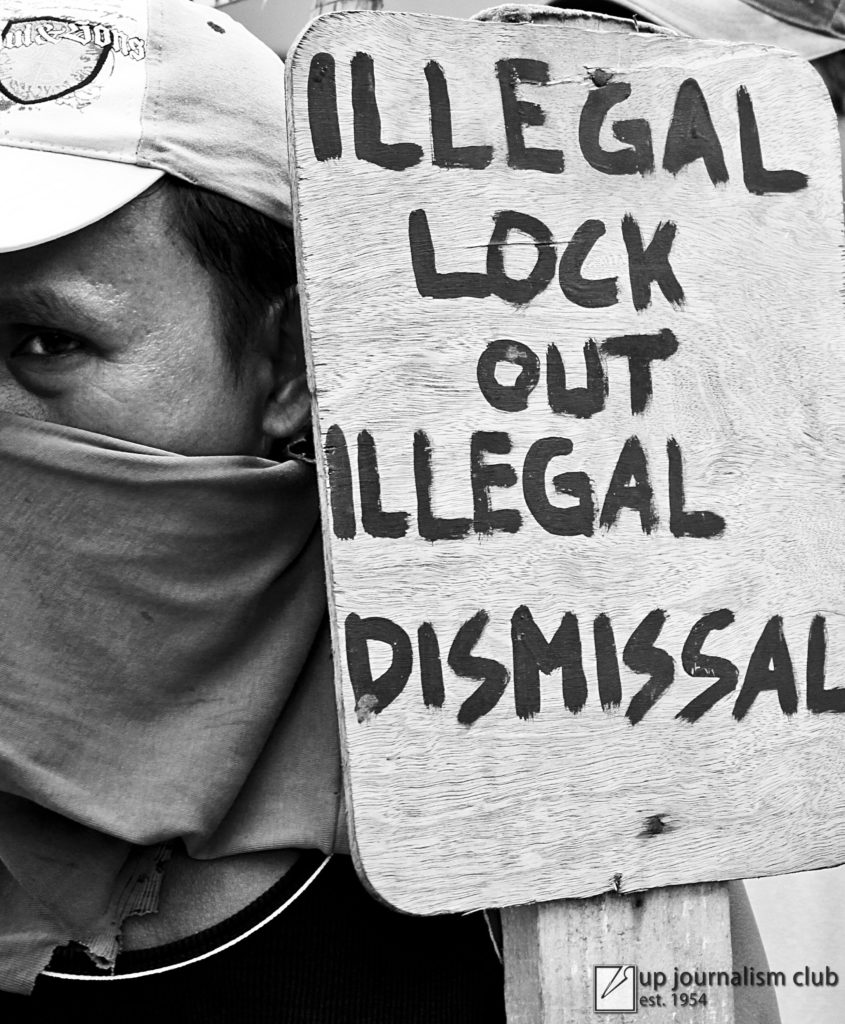
Legal woes
On behalf of Pentagon Steel, Alcover filed a petition to the NLRC for the issuance of a temporary restraining order (TRO) against the workers’ union.
The requested TRO would restrain workers and their sympathizers from “barricading and obstructing the free egress and ingress on the premises of [Pentagon Steel].”
The justification for the TRO was that the human barricade created by the workers was causing “substantial and irreparable injury to petitioner’s property and business operations,” as stated in the petition.
The petition further alleged that the workers conducted a ‘sit-down strike’ on April 12 “without any justifiable ground and without concurrence and approval of the authorized bargaining representative.” Alcover was reported to have written a letter to the union, complaining about the illegal act. According to Alcover, the union replied that they did not authorize the workers’ actions.
The workers’ first effort to organize themselves into a union was in 2011. As required by standard operating procedure, the workers checked their union’s legibility to be registered in the Bureau of Labor Relations.
It was found that there was an existing workers’ union for Pentagon Steel Corp., under the Philippine Trade and General Workers’ Organization (PTGWO) and the Trade Union Congress of the Philippines (TUCP), complete with a collective bargaining agreement (CBA) with the management, according to Jacinto “Intoy” Adenit, who has been a Pentagon Steel worker for more than 20 years.
Only four employees, all part of the management’s office staff, had knowledge about the union and the CBA: the union’s president, the vice president, secretary and treasurer – said to have been appointed by the company’s top officials, according to Leandro Gerodias, deputy secretary-general of the Kilusang Mayo Uno.
The NLRC granted the Pentagon Steel’s request for a 20-day TRO on April 30, and a preliminary injunction order against the workers’ picket on May 31.
Canciller expressed his disappointment with the process, as the TRO and injunction were granted “without any formal hearing.”
On June 22, a representative from the National Conciliation and Mediation Board (NCMB) visited the picket line and offered “technical assistance” to the workers, which seeks to gather the workers and the Pentagon Steel management on a face-to-face negotiation.
Rep. Aglibut Amorsolo of the NCMB explained that their office would look into the case and see if there is any basis to summon the two parties.
Amorsolo however said he could not say how long it would take to reach a settlement.
All by themselves
The Pentagon Workers’ Union demand only one thing: a written memorandum of agreement (MOA) with the factory management, which would ensure that their rights would be given and that all forms of harassment would be removed once they resume working.
“Hangga’t di nakararating sa MOA, hindi rin kami babalik sa loob. Kasi gusto rin namin yung siguridad namin pagbalik,” Canciller said.
((As long as we don’t enter into an [agreement], we will not go back inside the factory. We want to ensure our safety as we return.)
Canciller, however, said he relied on no one but themselves to achieve this goal, as he already lost trust with the legal systems of government.
“Sa manggagawa, napakatagal [ng proseso ng batas]; sa kapitalista, napakadali,” Canciller said.
(For us workers, the due process is so slow; but for the rich, it is very convenient.)
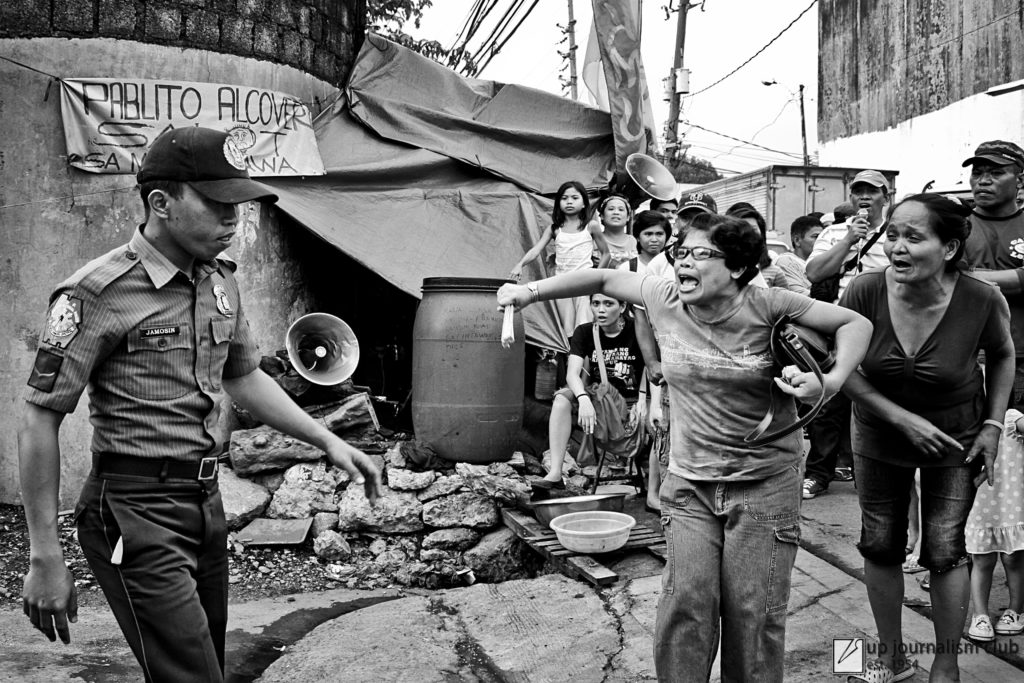
This story originally appeared in JC Reports on July 23, 2013, 10:03 PM.
JC Reports was UP Journalism Club‘s official (now defunct) investigative reporting arm. It aimed to promote in-depth and investigative reporting of pressing college, university and national issues.



